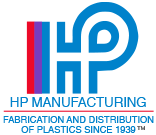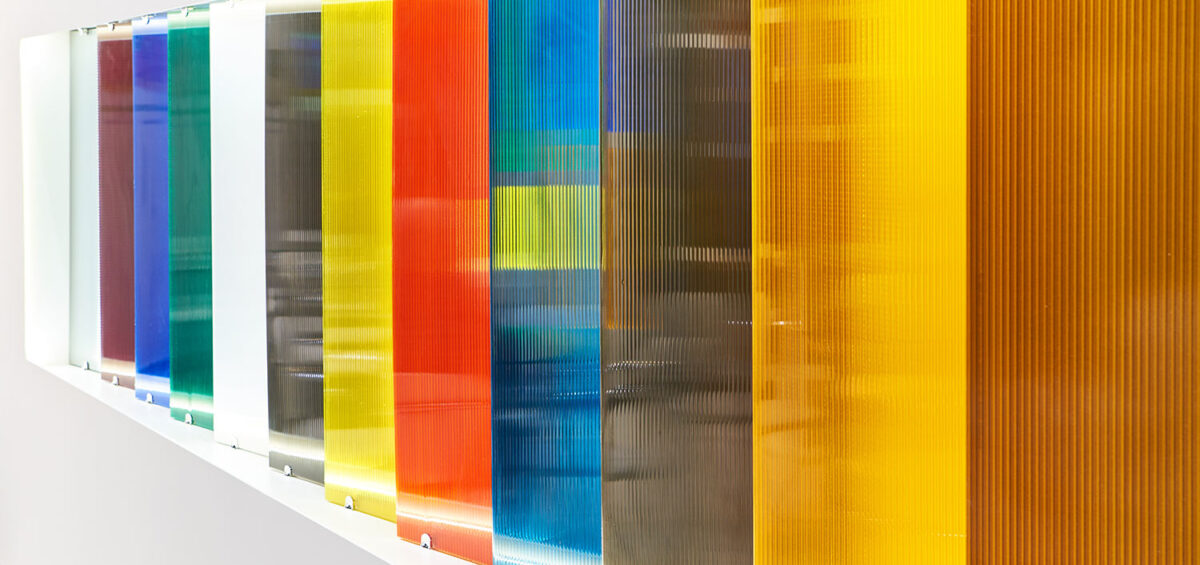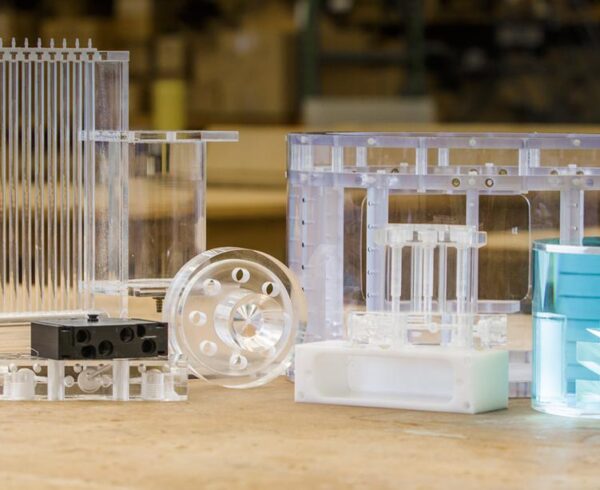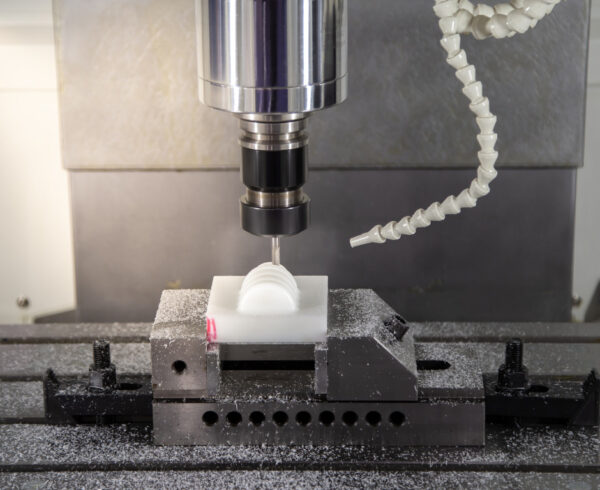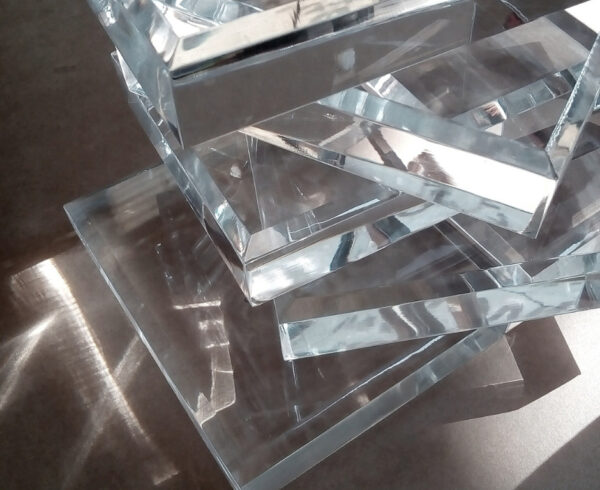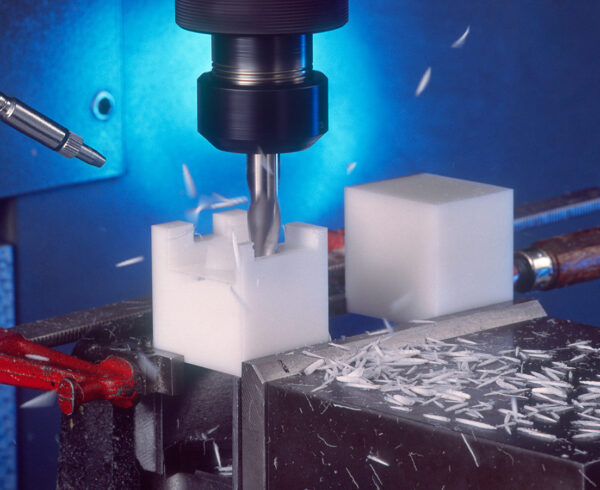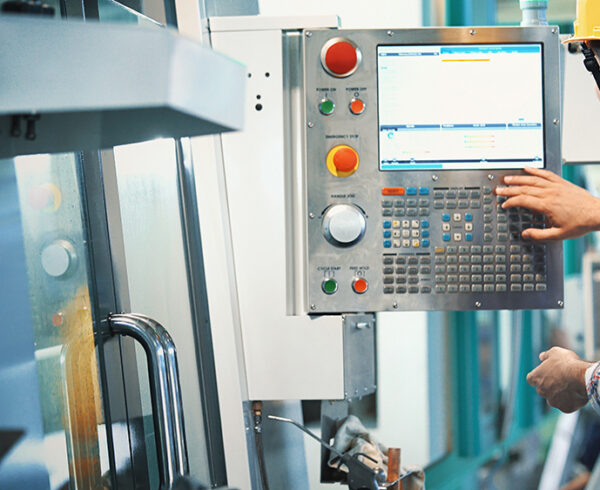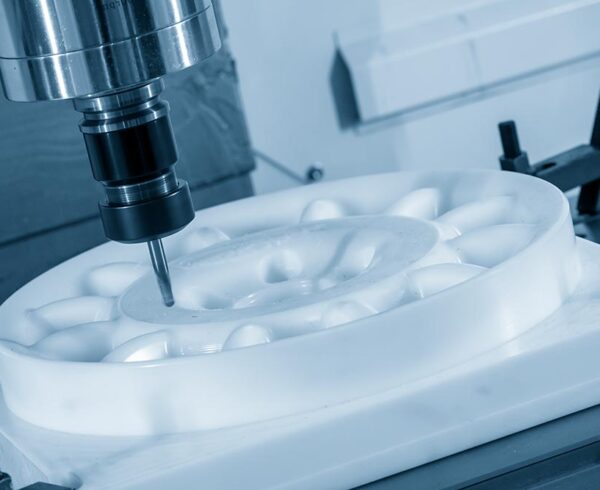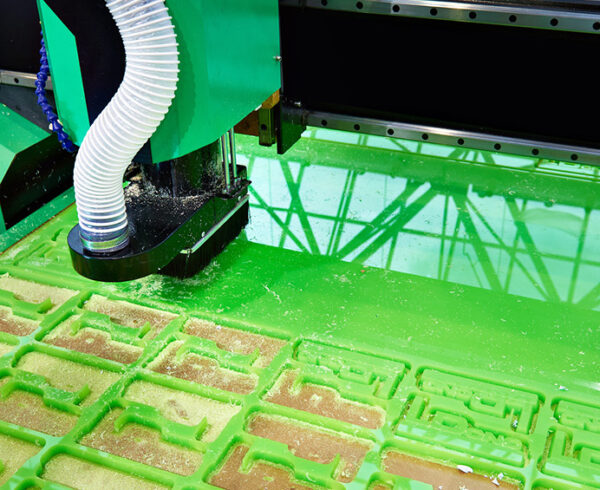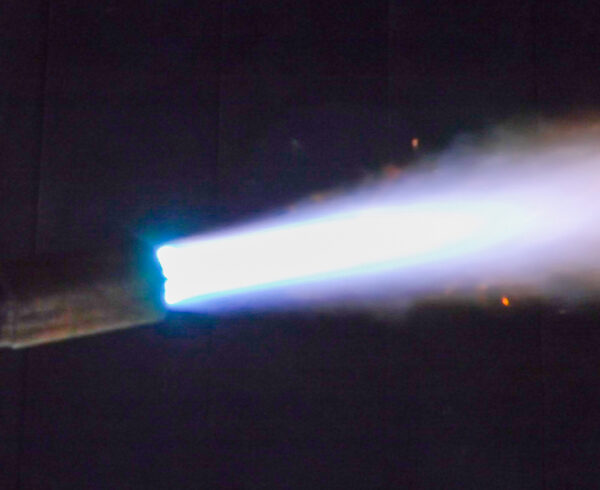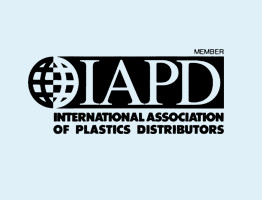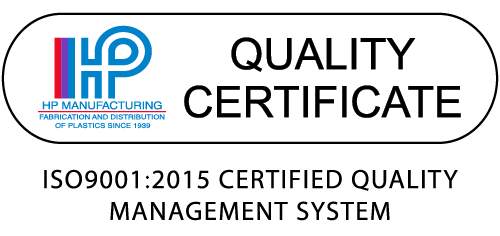Many clients come to HP Manufacturing with questions about polycarbonates and whether that’s the right material to use for their plastic fabrication project. To make that decision, there are a few engineering factors and trade-offs they need to consider first.
Among polycarbonates, perhaps the best known is the trademarked brand Lexan™, a superhero in the world of plastics for its characteristic toughness. Lexan is considered virtually unbreakable, with an impact resistance of up to 250 times greater than glass and 30 times greater than acrylic, which makes it a top choice for engineers in all industries that require this feature.
Polycarbonates were developed in the mid-20th century by General Electric and by Bayer in Germany in 1953, with each company lending it a unique brand name. Lexan, developed by GE, is a powerful brand name; however, designers and project engineers can consider other polycarbonate products as alternatives for commercial or industrial projects when polycarbonate attributes are required but budget considerations also factor into specifications. Polycarbonates offer other properties beyond their impact resistance that can make this material the best choice for fabrication, depending on the project’s desired attributes.
What Is a Polycarbonate?
Multiple companies make their own versions of polycarbonates. While perhaps the most familiar brand name is Lexan, at the end of the day, each possesses a similar molecular makeup and therefore similar properties. What can differ is the flame rating and some other ancillary attributes. Lexan is available in thin sheets to thick sheets that offer flame ratings from UL94HB (good) – UL94VO (best). HP Manufacturing can supply Lexan when circumstances warrant but also offers other polycarbonates with similar attributes.
A polycarbonate is a naturally transparent amorphous (without clearly defined shape or form) thermoplastic. All plastics are either thermoset or thermoplastic. Thermoset plastics can only be heated once, which results in a chemical change that cannot be reversed. Thermoplastics under heat can melt or be formed. There are a variety of engineering tradeoffs associated with these two plastic characteristics.
Polycarbonates are made commercially available in a variety of colors with varying degrees of translucency. Makrolon®, the Bayer-branded variety of polycarbonate, is available in larger sheet sizes and a variety of colors mainly to serve the sign industry. Colored or tinted polycarbonates can be more expensive.
As a raw material, polycarbonates are clear and allow for the internal transmission of light in nearly the same capacity as glass. Polycarbonates are used to produce a variety of parts and products but supply the greatest value when impact resistance and/or transparency is required along with a flame rating. This is important for applications such as medical imaging and machine guards.
What are the Pros and Cons of Polycarbonates?
Polycarbonates offer very good heat resistance and, in fact, can be combined with flame-retardant materials to amplify this feature without significant material degradation. Polycarbonates offer an amazing impact strength compared to other plastic materials, which is four to five times that of acrylic and higher than ABS (Acrylonitrile Butadiene Styrene) or PVC.
Another attractive feature of polycarbonate material is that it is very pliable. Typically, when using thinner gauges, it can be formed at room temperatures without cracking or breaking, similar to aluminum sheet metal. This feature makes polycarbonate sheet stock useful for applications when a non-conductive material or one with good electrical insulation properties is required, or, for example, when an object or part requires transparency, which sheet metal could not supply.
Although not a feature normally associated with common polycarbonates, HP Manufacturing can supply a polycarbonate that is static dissipated, which prevents a charge generation on the sheets’ surface. This is a material upgrade and is particularly suitable for high-voltage applications.
Polycarbonates as a pliable material are soft, and when struck with force, will dent rather than shatter, as would acrylic. The junction of pliability and impact resistance, or its ability to absorb energy, is what makes polycarbonate tough and unlikely to break.
While one of the biggest drawbacks is that polycarbonates can scratch easily, a coating of MR10 can solve this problem, thereby creating a surface that can withstand abrasion and weathering.
An overview of the qualities and characteristics of polycarbonate:
- Pros
- Virtually unbreakable
- Flame ratings
- Pliability
- Resistant to many types of chemicals
- Machinable
- Optical clarity
- Lightweight (half the weight of glass)
- Static dissipative (by special request)
- Cons
- Branded types can be expensive
- Easy to scratch
- Forming requires additional processes
Is Polycarbonate Machinable?
Polycarbonate materials are in fact highly machinable and can even be cut/shaped using standard carpentry tools (although that’s not what we would recommend for industrial components that need tight tolerances and consistency). As a pliable material, a polycarbonate sheet is in fact easier to machine than something more brittle that’s susceptible to cracking and damage during forming. It could even be rolled into a cylinder for shipping, for example. The soft nature of the material demands a skilled operator for milling or cutting on a CNC saw or other device to achieve tight tolerances.
When specifying materials for a project, engineers can specify Lexan, if required; however, there could be less expensive versions of a polycarbonate that will meet specifications and help keep the project within or under budget. The best course of action is to have a discussion with the engineering staff at HP Manufacturing to discuss project specifications and desired material features to determine the polycarbonate best suited for the application.
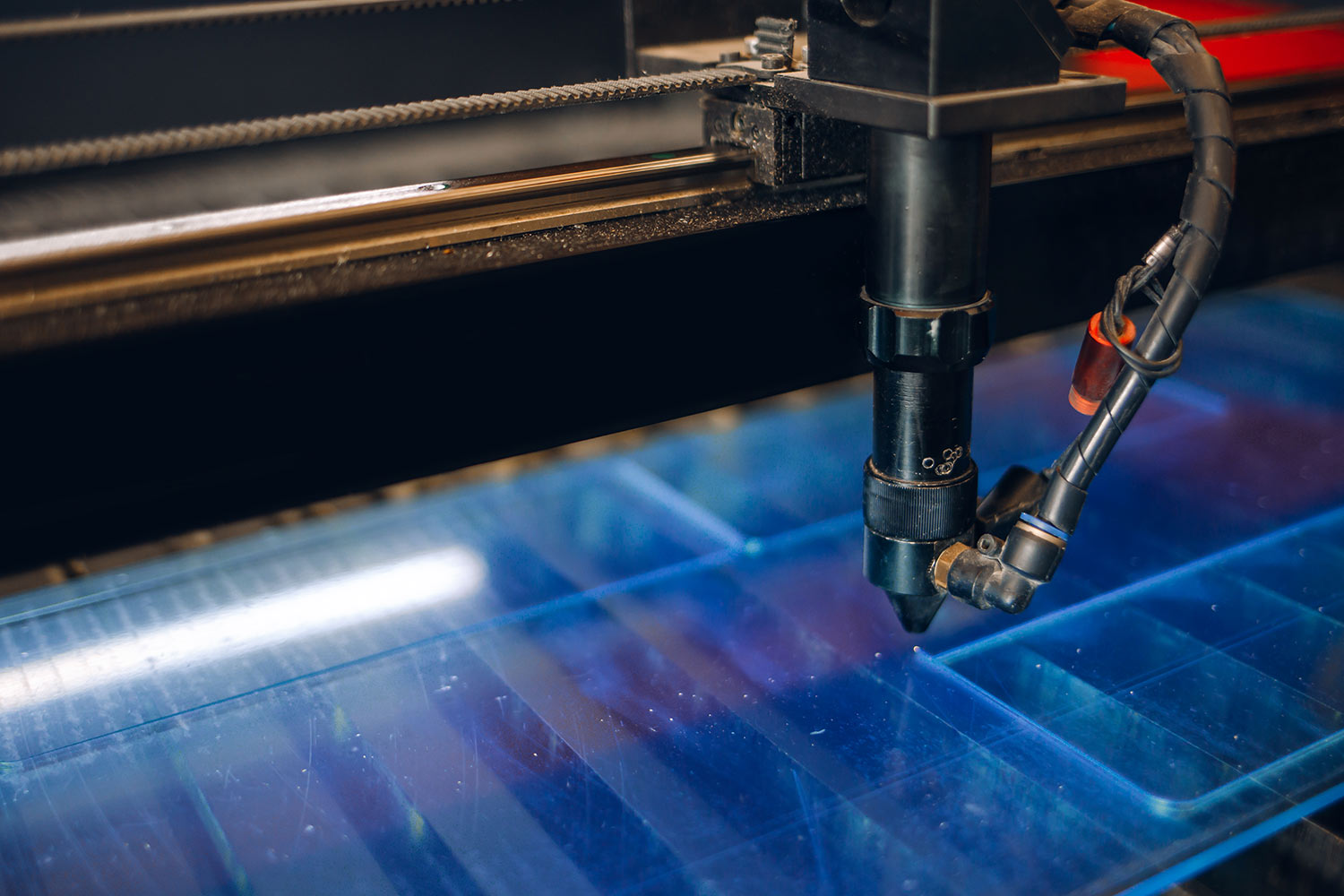
What Are the Common Forms of Polycarbonate?
This plastic is available in sheets, rolls or tubes and can be bent or rolled for shipping purposes. Thicknesses can vary from 0.02 to 3-plus inches.
Polycarbonate comes in two forms: optically clear like acrylic, or machine grade. HP Manufacturing works with both varieties.
Tinted polycarbonate is available, as well as smoked, bronzed or black, but purchasers should be aware that colored polycarbonate is going to be more expensive than transparent, usually starting at double the price of the clear, basic form.
What Are the Best Applications for Polycarbonate Use?
While polycarbonates appear in multiple consumer products from eyeglasses to the panes in greenhouses, at HP Manufacturing the most common requests or applications for polycarbonates usually include:
- Machine guards—Due to its natural transparency, a polycarbonate allows the operator to see through the machine guard to the operations it covers. It is impact resistant to protect the operator. Often, the guard is used or installed near something electrical that generates heat, which necessitates a polycarbonate for the flame rating.
- Electrical installations –Polycarbonate can be non-conductive and flame rated.
- Sight ports or windows—Clear like glass but impact resistant and strong, polycarbonates can handle the pressure required for a sight port or window.
- Medical imaging—Materials used in this industry for medical devices or gantry rings must have a high flame rating, with polycarbonates rated at UL-94V0, the highest available.
Why Choose HP Manufacturing for Polycarbonate Projects?
HP Manufacturing specializes in machining polycarbonates into custom shapes or complex geometries with very tight tolerances. While polycarbonates are machinable, the combination of pliability and impact resistance means certain procedures are necessary to achieve proper machining. Medical imaging and the aviation industry might call for parts or equipment made from polycarbonate and machined into complex geometries.
In addition, HP Manufacturing can work with project engineers to assist with material selection by matching the base material to specifications. There are alternatives within the polycarbonate material choices that can offer the right combination of desired features while remaining within budget.
HP Manufacturing has worked with plastics since its founding in 1939. While HP Manufacturing does work with Lexan, it also can supply other types of polycarbonates to help save on costs. HP Manufacturing works with trusted partners for material supply that will provide the properties required for the project at hand. We strive to exceed expectations for tight tolerances that other companies find difficult to achieve.
Manufacturers, please click here to request a quote.
Consumers, please click here to request a quote.
